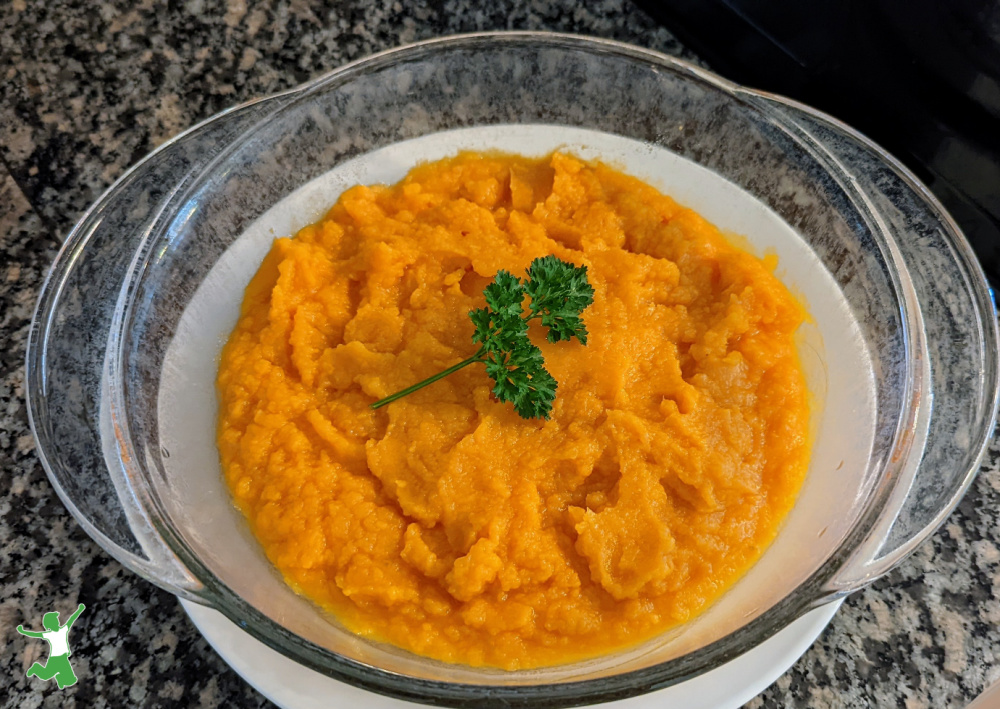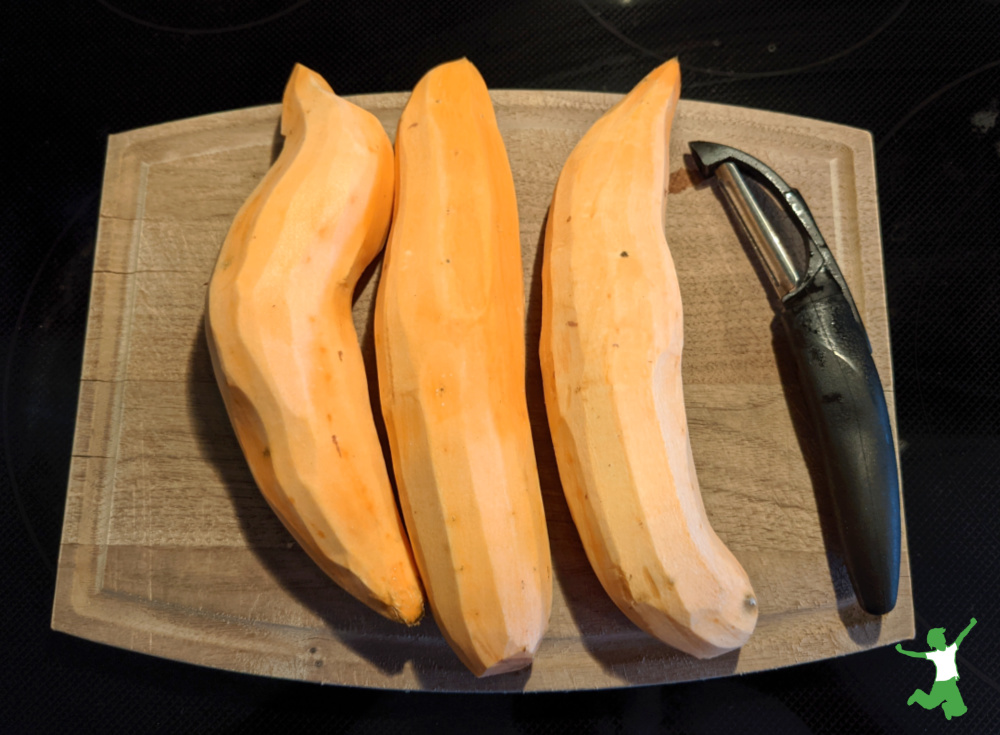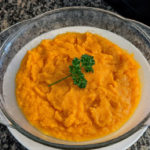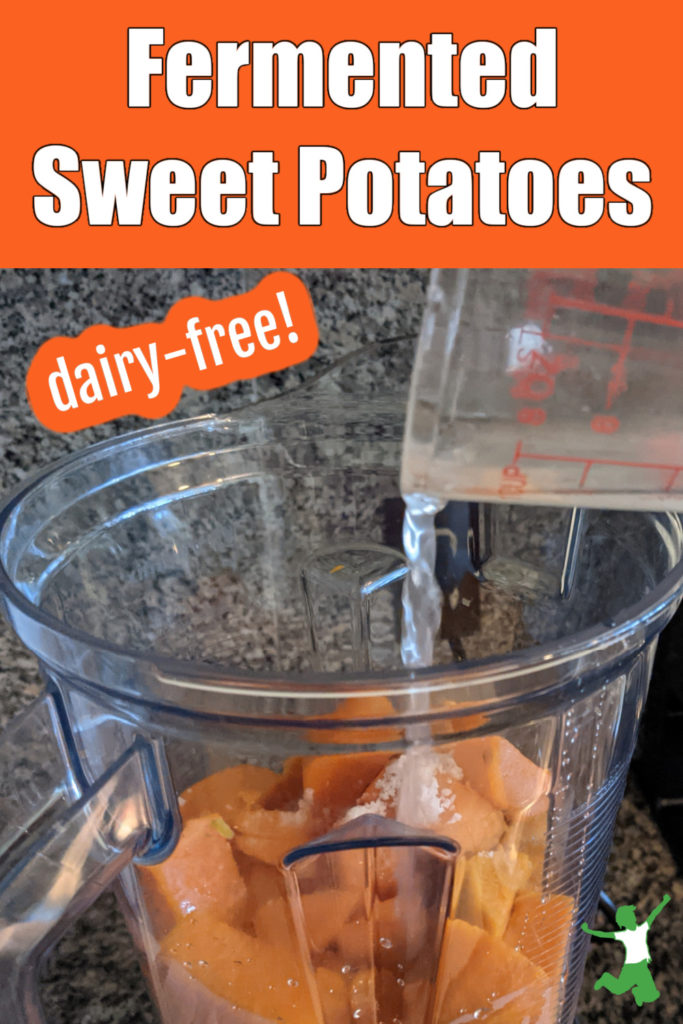Fermented sweet potatoes cultured without dairy for a delicious, probiotic-rich dish that is also loaded with enzymes, a delicious complement with steak or any meal where sweet potatoes work well.

One of the most common requests I receive regarding my popular fermented white potatoes recipe is how to make it paleo-friendly and cultured without dairy.
To meet these requests, I’ve developed this variation below for fermented sweet potatoes. It was inspired by a subscriber who used pickle juice instead of yogurt as the culturing medium for the starchier version.
This got me thinking about sauerkraut juice as an excellent way to ferment sweet potatoes. There are many traditional-style recipes that combine these two flavors, so in theory, it should taste great!
I am happy to confirm that this combo does indeed taste delicious. And, it is an excellent, frugal use of that probiotic-rich sauerkraut juice. Some folks wonder how to use this up after consuming a batch of homemade sauerkraut.
If you don’t make sauerkraut yourself, you can use the juice from commercial versions.
The sauerkraut must be raw and found in the refrigerated section.
The liquid from shelf-stable sauerkraut contains no probiotics or enzymes. Thus, it is not effective as a non-dairy fermentation starter.
I used two pounds of Jewel sweet potatoes for this recipe. However, feel free to use Japanese, Hannah, or any type of sweet potato you wish that is regionally available.
Here is what approximately two pounds of sweet potatoes look like washed, peeled, and ready to ferment.

More Sweet Potato Recipes to Try!
Love sweet potatoes? Try these other recipes too!

Fermented Sweet Potatoes Recipe
Fermented sweet potatoes cultured without dairy for a delicious probiotic-rich dish that is also loaded with enzymes.
Ingredients
- 2 pounds sweet potatoes preferably organic
- 1 cup raw sauerkraut juice plain, preferably organic
- 2 tsp sea salt
Instructions
-
Wash and peel the sweet potatoes. Removing the skin greatly reduces the chances of fermentation mold.
-
Chop into cubes and boil in filtered water for about 20 minutes or until soft.
-
Drain water from cooked sweet potatoes and let cool for 20 minutes. This is important to ensure that they are just warm and not too hot, which would destroy the probiotics in the sauerkraut juice.
-
Blend cooked sweet potatoes with sauerkraut juice and sea salt until a smooth puree.
-
Spoon sweet potato mash into a glass bowl and cover. Leave on the counter for 1-2 days and then refrigerate.
-
Cultured sweet potatoes will last about a month in the refrigerator.
-
Serve with steak as an enzyme-rich side dish or with any meal where sweet potatoes work well.
-
Fermented sweet potatoes may be slightly warmed on the stove before serving, but take care not to warm them hotter than 118 °F/ 48 °C else the enzymes and probiotics will be lost.









Could this recipe be used for babyfood?
This is the sweet potato baby food I used. https://www.thehealthyhomeeconomist.com/sweet-potato-casserole-best-baby-food-ever/
The lactic acid in fermented food is not easy to handle for some babies. After age 1 or so, you can give it a try. Just a small taste and see how it goes increasing from there.
I wouldn’t have thought of fermenting sweet potato’s, but it seems like they would be healthier than regularly prepared sweet potatoes and enjoyable to eat. Could whey be used in place of sauerkraut juice?
Yes, you can definitely ferment them with whey. However, you wouldn’t do a straight substitution. You would use a cup of water less 1 tbl. Then, 1 tbl of whey plus the salt.
Are the sweet potatoes actually fermented? or merely have added probiotics? Thank you for the clarification.
I added a probiotic starter that ferments the sweet potatoes (they are left on the counter for 1-2 days). If they weren’t fermented, the sweet potatoes would have gone bad on the counter after that long.
we love fermented potatoes!
we ferment sweet potatoes and all other varieties raw with just a salt brine all the time and it works great! no dairy or other ferments needed 🙂 an airlock jar for anaerobic fermentation makes it especially easy. ? then we bake them whole, dice and roast or add to soups/stews, boil and mash, or prepare them just like you would raw potatoes 🙂
Thank you for sharing your method!
Hi Lexee – I’m really interested to hear how you ferment potatoes. I’m wondering if this might be helpful in reducing the oxalates in potatoes and sweet potatoes.
Can I please ask what percentage brine you use and how long you ferment them for? Do you ferment the potatoes whole or do you cut them up first? (I’m thinking if you cut them up too small, they might absorb too much of the brine and become too salty?)
Thanks so much for sharing your knowledge ?